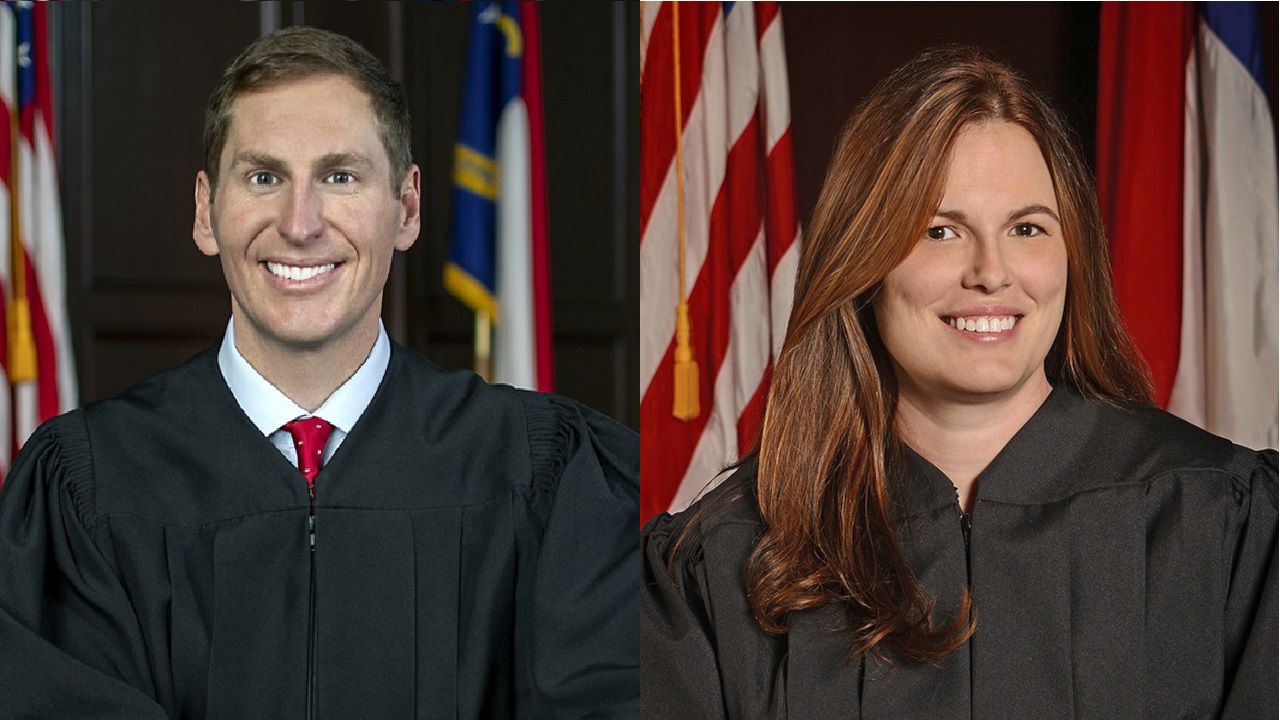RALEIGH, N.C. (AP) — A federal appeals court has temporarily blocked North Carolina election officials from contacting voters whose disputed ballots in an unresolved 2024 state Supreme Court race could be eliminated from the final count.
What You Need To Know
A federal appeals court has temporarily blocked North Carolina election officials from contacting voters whose disputed ballots in an unresolved 2024 state Supreme Court race could be eliminated from the final count
In a 2-1 decision, an appellate panel on Tuesday granted the stay request of Democratic Associate Justice Allison Riggs
Riggs has asked federal judges to reverse the recent rulings of state appellate courts that largely favored Republican Jefferson Griffin’s requests to toss ballots that he challenged
In a 2-1 decision, a panel of the 4th U.S. Circuit Court of Appeals in Richmond, Virginia, granted the stay request of Democratic Associate Justice Allison Riggs, who has asked federal judges to throw out the recent rulings of state appellate courts that largely favored Republican challenger Jefferson Griffin's requests to toss ballots that he challenged.
Democrats and voting rights groups have raised alarm about Griffin's effort, calling it an attack on democracy that would serve as a road map for the GOP to reverse future election results in other states. The state Republican Party says Griffin's efforts are about ensuring that only legal votes are counted.
The court's decision late Tuesday means government election workers are prohibited — at least for now — from carrying out a process mandated by state judges who ruled earlier this month that voters within two categories were ineligible. Most of these military or overseas voters, once contacted formally, would get 30 days to provide additional identifying information so that their race choices would remain in the tally. Others, however, would be unable to “cure” their ineligibility and their ballots would be removed.
Riggs leads Griffin by just 734 votes from more than 5.5 million ballots cast in what is the nation’s last undecided race from November's general election. The stay keeps these numbers in place while Riggs and her allies seek a federal trial judge to declare it would be unlawful to remove any of these ballots from the totals.
After two recounts appeared to confirm a Riggs victory, Griffin soon after the Nov. 5 election filed protests that grew to more than 65,000 ballots. Ensuing state court rulings whittled down the total to as few as 1,675 ballots or perhaps as much as 7,000, according to court filings. Actual totals are still being hashed out in state court. The fewer the ballots that could be potentially removed, the likely tougher it would be for Griffin to overtake Riggs.
Attorneys for Riggs and other groups seeking Tuesday's stay told the 4th Circuit that without it, mailings going out soon to affected voters would only increase voter confusion, especially if federal courts later overturn the state court decision.
Tuesday's prevailing order from U.S. Circuit Judges Paul Niemeyer and Toby Heytens said granting a stay was proper while U.S. District Judge Richard Myers rules on claims by Riggs, the State Board of Elections and others that the U.S. Constitution and federal voting laws prevent the ballots from being canceled.
“We enjoin the North Carolina State Board of Elections from mailing any notice to any potentially affected voter pending the district court’s resolution of Riggs’ motion for a preliminary injunction,” the order reads.
In a dissenting opinion, Circuit Judge Marvin Quattlebaum Jr. said that Myers committed no error by simply ordering previously that the state board not certify any outcome in the race while he considers legal arguments. Quattlebaum was an appointee of President Donald Trump. Heytens and Niemeyer were appointed by Presidents Joe Biden and George H.W. Bush, respectively.
Riggs campaign spokesperson Dory MacMillan said the motion pauses “a confusing and burdensome cure process for ballots that had nothing wrong with them" and "we’re confident that federal law prohibits these votes from being thrown out.”
Griffin's lawyers argued the stay request should have been denied and say federal courts should let stand state court decisions that remove votes from ineligible voters.
“We expect the litigation of this case to continue for some time," Griffin campaign spokesperson Paul Shumaker said Wednesday. "The ruling only further delays an outcome.”
One category of ballots that state appeals courts declared shouldn't be counted were cast by overseas voters who have never lived in the U.S. but whose parents were declared North Carolina residents.
The other disallowed category covers military or overseas voters who did not provide copies of photo identification or an ID exception form with their absentee ballots. Election officials have been told to notify these voters and tell them they could turn in an ID copy or exception form within 30 days for their vote to count.
Griffin, who is a state Court of Appeals judge, and Riggs have not participated in deliberations in their respective courts about their election.


